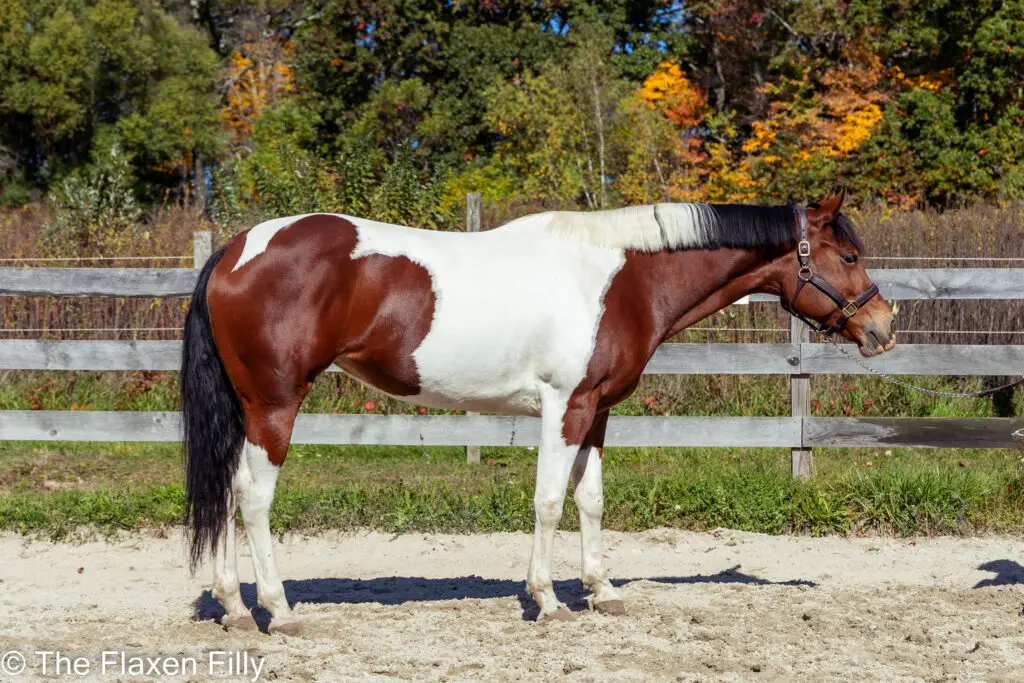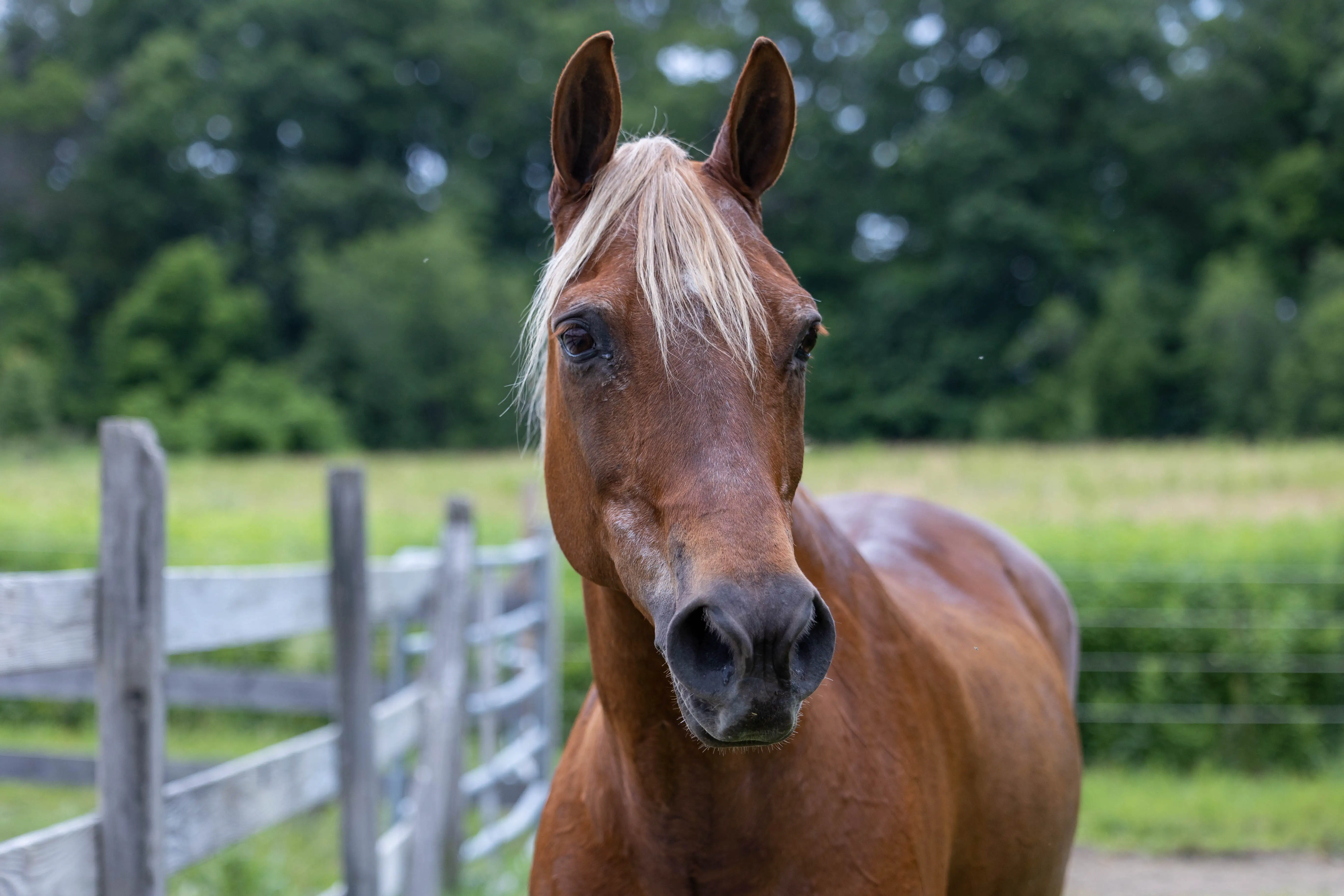Thinking about buying a horse? In this article we’ll discuss the seven reasons you need to do a pre-purchase exam before you seal the deal. If your heart is telling you that you’ve found the right match, a pre-purchase exam will help you confirm if the horse can meet your needs and help you plan for his future care.
Horse ownership is a big commitment! Having as much information as possible before the sale will help you avoid issues and enjoy your horse.
What Is A Pre-Purchase Exam
Before we get into the list let’s talk about what a pre-purchase exam or PPE is. A PPE is an exam conducted by a veterinarian to give potential buyers and idea of the horse’s current health.
It’s important to have a veterinarian that is not associated with the seller conduct the exam. This way you can be assured that they are objective. At the beginning of the exam the vet will ask you what you intend to do with the horse.
Understanding the buyer’s needs is important for the vet. It will give the vet a better idea of how impactful any potential issues or signs of lameness could be. A horse that trail rides once a week has different needs than a high level jumper Depending on the buyer’s needs the he or she may want to take additional precautions such as getting x-rays and blood work.
Most commonly, a PPE consists of a general health check along with a lameness examination. A general health exam will give the buyer an understanding of the horse’s overall health at the time. The vet will examine the horse’s eyes and vision, ears, heart, lungs, legs, lumps and bumps, conformation, hooves etc.
During the lameness portion of the PPE the vet will watch the horse move and may conduct a flexion test to identify any existing or potential lameness. At this point, the vet can recommend further testing based on what they see and the buyer’s intentions.
If you’re considering buying a horse check out these related articles that will help you find the right horse!
9 Horse Buying Mistakes You Should Avoid
11 Ways To Help Your New Horse Settle In & How To Prepare
What You Need To Know When Buying Your First Horse
Essential Supplies You Need To Buy For Your First Horse
Should You Lease A Horse Before Buying? Complete Guide
A Pre-Purchase Exam Is A Fact Finding Mission
If the thought of finding out there is something wrong with the horse you have your heart set on is overwhelming, fear not! A PPE is not a pass or fail test! Rather, it is simply a snapshot of the horse’s health at this time. You will undoubtedly find issues during a PPE. Knowing about the issues up front will help you determine your threshold for risk.
If you have the knowledge, time and funds to handle the issues that arise, you will still consider buying the horse. On the contrary, if you uncover an issue that is too risky, it may be better to pass on the horse.
The purpose of a PPE is to inform the potential buyer and their trainer, objectively, about the horse. At the end of the day, the decision is still yours.
It is in the horse’s best interest for a potential buyer to know as much as possible about his health. You can’t plan for or provide the care the horse needs if you don’t know exactly what he needs. For example, if you find a horse with some minor arthritis, you will have the information you need to decide how to manage it the best way possible.
However, if you were unaware of the arthritis, you could be asking the horse to perform beyond his ability and causing him pain. This could become frustrating for both of you.
Any experienced horse owner will tell you, the way to get the most out of your horse is to provide him with the best possible care and keep him feeling his best.
Different PPE Options Depending On Your Needs
As I mentioned earlier in this article, the veterinarian will want to understand your needs as a horse owner. Depending on your needs and desires the vet can conduct a more in depth exam to identify issues or just check his overall health.
Before you get started, find out from the veterinarian exactly what services are covered as part of the standard PPE. Not all vets conduct a PPE exactly the same way. Once you’ve established the base PPE, talk about whether you are interested in additional services and the cost.
Remember, it’s up to you how far you want to take the exam. And the veterinarian can give their recommendation based on what they find and what you’ve told them.

Pre-Purchase Exam To Plan For Long Term Care
No horse is perfectly healthy and sound without flaw. You will inevitably find issues, it’s important to know what they are. Plan for both the financial commitment as well as the ability to provide the necessary management.
In order to keep your horse feeling his best you will want to understand what maintenance he requires or may need later. If an issue is minor but has the potential to get worse you can ask the veterinarian about signs to watch for and what activities to avoid.
It might be as simple as scheduling regular chiropractic visits for the horse or keeping him on a strict shoeing schedule with your farrier.
Small changes in your routine could have a big impact on your horse! Especially if he is prone to any problems.
Keeping up on care and maintenance can be costly, so after the pre-purchase exam take some time to think about your financial situation. Research the cost for the care your new horse will need above and beyond normal feed and supplies.
Objective Opinion From A Veterinarian
Any horse lover regardless of experience level is prone to falling in love with a horse. Whether it’s the right horse or not can be difficult to determine.
Once you catch the horse bug, there is no cure and it never goes away. While most of the time this leads to lots of fun and adventure, it can also blur your vision making it impossible to be objective.
As Dr. Barb Crabbe states in this article from Practical Horseman Magazine;
“Rarely do we look at a horse in [this much] detail, even when we own them,” she says. “And once you have reached the pre-purchase point of looking at a horse, typically you are in love and really don’t want to hear about problems. So you have to count on someone else to keep you honest.”
– Barb Crabbe, DVM Practical Horseman Magazine
Refer Back To Pre-Purchase Exam Notes Later
When it comes to horses it’s only a matter of time before you notice a sign that something may be wrong. Things happen, that is just part of horse ownership.
However, if your horse starts to become sore or shows signs of another problem worsening it might be time to follow up with your vet.
At the end of your PPE the veterinarian will provide you with a written report. The report will contain the details of the exam and the vet’s observations.
So, file it away in a safe place! You may want or need to check the vet’s notes at a later point. For example, you may not remember whether the horse’s left or right hock was a potential concern. And, two years later your horse seems to have some hind-end soreness. It might be helpful to look back at the notes from the vet.
I hope this article has been helpful, don’t forget to share it with your friends!


Great post! I was just looking for info like these. My daughter love horses and wants to have one ! But I know nothing about horses
www.LinhyBanh.com
These are great insights needed prior to purchasing a horse. I love the detailed information about the pre purchase exam. Such a necessary step before buying a horse. Thank you for all of the tips!